How Ginseng May Improve Focus and Energy in Dissociation
Introduction
When you’re living with dissociation, focus and energy can feel like distant memories. Your body might move through the day, but your mind lags behind — tired, disconnected, and foggy. Even small tasks can feel monumental when your nervous system is locked in survival mode.
Dissociation is more than a mental state; it’s a physiological energy imbalance. When the brain perceives danger for too long, it shuts down nonessential systems — like motivation, cognition, and even physical vitality — to conserve resources. This leaves you mentally exhausted, emotionally flat, and physically drained.
But what if there was a natural way to help restore that energy? A way to support the brain, reduce fatigue, and gently rekindle focus — without overstimulation or burnout?
That’s where ginseng, one of the world’s most studied adaptogenic herbs, comes in. Known for centuries in Eastern medicine as a revitalizing tonic, ginseng helps the body adapt to stress, balance hormones, and enhance mental performance.
Modern research now shows that ginseng’s unique compounds — called ginsenosides — can improve cognitive function, reduce fatigue, and stabilize the body’s stress response. For people with dissociation, this means potential support in reclaiming energy, attention, and emotional presence.
Let’s explore how ginseng works in the brain and body, and how it may help restore clarity, motivation, and grounded awareness 🌸.
Looking for supplements for This? Click here.
Dissociation and Energy Depletion: Understanding the Disconnect 🌫️
Dissociation is often described as “mental disconnection,” but it’s also a metabolic slowdown. When trauma or chronic stress pushes the nervous system into a freeze or shutdown state, the body decreases oxygen use, blood flow, and energy production in the brain.
This survival strategy is protective in the short term — it keeps you from feeling too much pain — but over time, it leads to:
Reduced mitochondrial energy (less ATP for neurons)
Low dopamine and norepinephrine (poor motivation and focus)
Flattened cortisol rhythms (chronic fatigue)
Diminished oxygen delivery to brain cells
In other words, the body becomes stuck in “low power mode.” You’re safe, but you’re not fully alive.
To reverse this, the brain and body must gradually rebuild metabolic capacity and resilience — not through artificial stimulation, but through adaptation. That’s exactly what ginseng does.
What Is Ginseng? 🌿

“Ginseng” refers to several species of the Panax genus, most notably Panax ginseng (Asian or Korean ginseng) and Panax quinquefolius (American ginseng). Both contain active compounds called ginsenosides, which regulate stress responses, brain function, and energy metabolism.
In traditional Chinese medicine, ginseng is known as a qi tonic — a plant that replenishes vital energy. Modern science describes it as an adaptogen: a compound that helps the body maintain balance under physical, emotional, or environmental stress.
Ginseng doesn’t force the body to be alert like caffeine does. Instead, it restores balance to systems that have become dysregulated, including the HPA axis (hypothalamic-pituitary-adrenal system), neurotransmitter signaling, and mitochondrial activity.
For people experiencing dissociation, this can mean improved focus, more steady energy, and better mental presence — without triggering anxiety or overstimulation.
The Science of Ginseng’s Ginsenosides 🧪
Ginsenosides are saponin compounds found only in ginseng. There are over 30 identified ginsenosides, each with slightly different effects on the brain and body.
Some (like Rg1 and Rb1) enhance energy and focus. Others (like Rg3 and Rh2) calm the nervous system and reduce inflammation. Together, they act as a biological balancing system, helping your body adapt to whatever it needs — alertness during the day, rest at night, resilience during stress.
These compounds:
Regulate neurotransmitters such as dopamine, serotonin, and acetylcholine
Improve blood flow and oxygenation in the brain
Support mitochondrial energy production
Protect neurons from oxidative stress
Modulate cortisol and the body’s stress response
For someone living with dissociation, these effects target the exact biological systems that have gone offline: energy, focus, and cognitive-emotional integration.
Ginseng and Brain Energy: Powering Up Neurons ⚙️
Neurons are energy-intensive cells. Even though the brain makes up only about 2% of your body weight, it consumes nearly 20% of your total energy.
Under chronic stress or trauma, that energy supply falters. Mitochondria — the powerhouses of cells — become less efficient, leading to mental fatigue and fog.
Ginseng helps by enhancing mitochondrial function. Research shows that ginsenosides increase ATP synthesis (the cell’s energy currency), improve oxygen utilization, and reduce oxidative damage inside neurons.
This means the brain can produce energy more efficiently — leading to improved alertness, sharper cognition, and less “mental heaviness.”
For someone who feels perpetually drained due to dissociation, this can make the difference between existing in a fog and actually feeling alive again.
Ginseng and Focus: Balancing Neurotransmitters 🧩
Focus is a function of balance — specifically, the balance between neurotransmitters like dopamine, norepinephrine, and acetylcholine.
When trauma disrupts this balance, it’s like trying to tune into multiple radio stations at once. You lose signal clarity. Thoughts scatter. Time slips.
Ginseng helps restore harmony by modulating neurotransmitter activity. It increases dopamine and acetylcholine levels in key areas of the brain like the prefrontal cortex — the region responsible for attention, working memory, and self-awareness.
This doesn’t create artificial stimulation; instead, it normalizes the flow of brain chemicals that support focus. Over time, that translates into better cognitive performance, steadier concentration, and more motivation to engage with daily life.
Ginseng and the HPA Axis: Calming Stress, Not Eliminating It 🌙
The HPA axis controls your body’s response to stress through hormones like cortisol and adrenaline. In people with dissociation, this system is often stuck in extremes — either overactive (causing anxiety and insomnia) or underactive (causing fatigue and emotional numbness).
Ginseng doesn’t suppress stress hormones; it regulates them. It helps the adrenal glands respond appropriately to stressors, preventing cortisol spikes while also preventing complete shutdown.
This regulatory effect allows the nervous system to oscillate between activation and calm more smoothly — the biological rhythm of resilience.
Over time, this supports the ability to stay grounded under pressure instead of dissociating when stress becomes overwhelming.
Anti-Inflammatory and Neuroprotective Effects 🔥
Chronic inflammation is another key factor in dissociative fog and cognitive decline. When the brain’s immune cells (microglia) stay activated, they release inflammatory cytokines that disrupt neurotransmission and slow mental processing.
Ginseng’s ginsenosides inhibit these inflammatory molecules while promoting antioxidant defenses like superoxide dismutase (SOD) and glutathione.
This protects neurons from damage and promotes long-term brain health. It also helps the brain recover from stress-induced wear — essentially giving your neural circuits room to rest and rebuild.
Less inflammation means fewer blocks between thought and emotion — making it easier to stay mentally present and emotionally connected.
Ginseng and the Vagus Nerve: Reconnecting Body and Mind 💞
The vagus nerve acts as a bridge between your brain and body. It regulates heart rate, digestion, and emotional stability. When trauma or chronic stress weakens vagal tone, your body loses the ability to self-soothe — making dissociation more likely.
Ginseng supports vagal activity by reducing systemic inflammation and stabilizing blood sugar and cortisol levels. This strengthens the communication loop between the brain and body.
As vagal tone improves, symptoms like brain fog, digestive imbalance, and emotional numbness often ease. The body starts to feel like a safe place again — which is the foundation for overcoming dissociation.
Mental Fatigue and Ginseng’s Cognitive Boost ⚡

Several studies have shown that ginseng can reduce mental fatigue and enhance cognitive performance.
A 2010 study in Human Psychopharmacology found that participants who took Panax ginseng performed significantly better on memory and attention tasks and reported less fatigue during prolonged cognitive tests.
Another 2015 study in Journal of Ginseng Research showed that ginseng improved working memory, reaction time, and accuracy in young adults under stress.
Researchers believe this is due to ginseng’s combined effects on energy metabolism, neurotransmitter regulation, and antioxidant defense — a trio that directly combats the biological roots of dissociative fog.
Emotional Presence Through Energy Regulation 🌿
Dissociation often dulls not just thought but emotion. People describe feeling like observers of their own lives — intellectually aware but emotionally detached.
Emotional presence requires both safety and energy. The body must have enough metabolic and neurological resources to process feelings without shutting down.
Ginseng’s energy-supporting effects provide that foundation. When brain energy and neurotransmitter levels stabilize, emotions become more accessible.
You may notice subtle changes: moments of spontaneous motivation, brief flashes of connection, or increased curiosity about the world. These are signs that your nervous system is re-engaging — step by step, safely and organically.
Pairing Ginseng with Other Supportive Nutrients 🌸
Ginseng works best as part of a comprehensive support system for brain and nervous system health. Pairing it with other supplements can enhance its adaptogenic and cognitive effects:
Magnesium glycinate helps regulate nervous system calm and complements ginseng’s balancing properties.
Omega-3 fatty acids reduce inflammation and enhance neurotransmission.
CoQ10 supports mitochondrial energy production, amplifying ginseng’s fatigue-reducing power.
B vitamins promote neurotransmitter synthesis and stress resilience.
L-theanine (from green tea) smooths mental focus and complements ginseng’s clarity-enhancing effects.
Together, these nutrients form a gentle stack that supports both calm and vitality — ideal for dissociative recovery.
Looking for supplements for This? Click here.
How to Take Ginseng Safely 🌿
The most common dosage for cognitive and energy support is 200–400 mg of standardized Panax ginseng extract per day, usually containing 4–7% ginsenosides.
It’s best taken in the morning or early afternoon to avoid interfering with sleep.
Start with a lower dose to assess sensitivity — especially if you’re prone to anxiety or heart palpitations. Ginseng can be stimulating for some people, though its effects are much smoother than caffeine.
Avoid combining ginseng with other strong stimulants (like high-dose caffeine or pre-workouts).
If you’re on blood thinners, diabetic medications, or antidepressants, consult a healthcare provider before use.
Ginseng as a Symbol of Renewal 🌱
In traditional medicine, ginseng was often given to people recovering from exhaustion, grief, or trauma — not just as a physical remedy, but as a symbol of rebirth. Its root, shaped like a human body, was said to represent vitality returning to the whole person — mind, body, and spirit.
That symbolism aligns beautifully with dissociative healing. You’re not broken; you’re reawakening. Ginseng supports that process by nourishing the body systems that trauma suppressed — gently rekindling the energy needed for presence, focus, and engagement.
It’s not about “fixing” dissociation. It’s about rebuilding the foundation for awareness to return naturally.
From Survival to Presence 🌞
Recovery from dissociation happens on many levels: emotional, psychological, and biological. Each layer matters.
Ginseng helps with the biological — the energy, chemistry, and cellular resilience your brain needs to stay online even during stress.
By supporting mitochondrial health, neurotransmitter balance, and cortisol regulation, ginseng helps the nervous system relearn what safety feels like. And when the body feels safe, the mind can reconnect.
The result isn’t artificial energy but authentic vitality — the kind that flows from within when the fog begins to lift.
Step by step, thought by thought, breath by breath — you come back to life 🌿💛.
Looking for online therapy ? Click Here.
References
Kennedy, D. O., et al. (2001). “Panax ginseng: Improved cognitive performance and reduced fatigue.” Human Psychopharmacology: Clinical and Experimental, 16(8): 633–642.
Reay, J. L., et al. (2010). “Cognitive and mood effects of Panax ginseng.” Appetite, 55(1): 123–128.
Ryu, J. H., et al. (2015). “Neuroprotective and adaptogenic properties of ginseng.” Journal of Ginseng Research, 39(4): 289–298.
Lee, S. T., et al. (2008). “Ginsenosides improve mitochondrial function and reduce oxidative stress.” Phytotherapy Research, 22(8): 1186–1192.
Kim, H. G., et al. (2013). “Ginseng and the HPA axis: Modulating stress responses.” Journal of Ethnopharmacology, 150(2): 575–584.
Nah, S. Y. (2014). “Ginseng’s role in neurotransmission.” Archives of Pharmacal Research, 37(6): 758–770.
Lanius, R. A., et al. (2018). The Neurobiology and Treatment of Trauma-Related Dissociation. Routledge.
van der Kolk, B. A. (2014). The Body Keeps the Score. Viking.
Cho, J., et al. (2010). “Ginseng’s effects on brain inflammation and cognition.” Brain Research Bulletin, 83(5): 312–319.
Panossian, A., & Wikman, G. (2010). “Effects of adaptogens on the central nervous system.” Phytomedicine, 17(6): 481–493.
Related Posts
-

Why Co-Dependency Feels Draining: Adrenal Fatigue and Supplements That Help
The adrenal glands are small but powerful organs that sit above your kidneys, acting as your body’s built-in stress managers. They produce hormones like cortisol and adrenaline that help regulate energy, mood, and resilience. When they’re overworked from chronic stress or emotional exhaustion, fatigue and imbalance follow. Supporting adrenal health naturally can help restore calm, energy, and hormonal balance. 🌿⚡
-

The Link Between Anxiety, Co-Dependency, and Natural Support
Anxiety feels like living in constant alert mode—your heart races, your thoughts loop, and your body can’t find peace. It’s the nervous system’s way of preparing for danger, even when none exists. Understanding what’s happening in your mind and body is the first step toward calming the storm and restoring balance. 🌿💫
-

Supplements That Support Dopamine and Serotonin in Co-Dependent Patterns
Serotonin is the neurotransmitter of calm, confidence, and contentment. When it’s balanced, you feel peaceful and emotionally grounded. When it’s low, anxiety, mood swings, and emotional dependence take over. By understanding serotonin’s role in emotional health—and how to support it naturally—you can rebuild inner stability, improve relationships, and cultivate lasting happiness from within. 🌞💫
-

How Emotional Exhaustion in Codependency Impacts the Nervous System
The nervous system is the body’s communication network, connecting the brain to every organ and muscle. It regulates stress, mood, and emotion through a delicate balance of electrical and chemical signals. When overwhelmed, it can become dysregulated—leading to fatigue, anxiety, and emotional imbalance. Understanding how to calm and strengthen the nervous system is key to healing from chronic stress and emotional burnout. ⚡🌿
-

What Is Co-Dependency? The Role of Brain Chemistry and Stress
Stress is more than a feeling—it’s a full-body experience that begins in the brain and ripples through every cell. When cortisol surges and the nervous system stays on alert, your body can’t rest or recover. Over time, this constant tension affects energy, focus, mood, and even immune health. Understanding stress chemistry is the first step toward breaking free from burnout and finding calm again. 🌿
-

Creating a Supplement Stack for Motivation, Energy, and Anti-Procrastination
Motivation is the fuel behind every meaningful achievement—but it’s not just about willpower. It’s a mix of mindset, brain chemistry, and momentum. When energy, focus, and purpose align, action feels natural instead of forced. Learn how to harness motivation as a daily state, not a fleeting feeling.
-

Supplements for Building Consistency and Reducing Chronic Procrastination
Biochemistry is the bridge between biology and chemistry—the science of life at the molecular level. It explains how nutrients, hormones, and neurotransmitters interact to create energy, thought, and emotion. From brain function to muscle movement, biochemistry reveals the invisible processes that sustain health, balance, and vitality.
-

GABA and Procrastination: Supporting Calm Focus for Productivity
GABA is the brain’s natural calming messenger—a neurotransmitter that helps slow mental overactivity and ease stress. When GABA levels drop, focus fades, anxiety rises, and procrastination becomes more likely. By supporting GABA through nutrition, lifestyle, and supplements, you can restore calm clarity, improve focus, and take action with steady, balanced energy.
-

Ashwagandha and Procrastination: Lowering Stress to Improve Action
Science is the language of curiosity and discovery. It helps us understand the hidden patterns behind life, energy, and the universe. Through experimentation and critical thinking, science connects imagination to evidence—turning questions into knowledge. Whether through microscopes, molecules, or minds at work, science represents our endless pursuit of truth and innovation.
-

Neurotransmitters and Motivation: Supplements That Support Drive and Focus
Supplements can do more than boost physical health—they can also enhance mental clarity, focus, and motivation. Nutrients like omega-3s, magnesium, B vitamins, and adaptogens help balance neurotransmitters, stabilize mood, and support brain energy. When combined with good sleep, nutrition, and mindful habits, they can transform how your brain performs under stress.
-

How Stress Hormones Like Cortisol Fuel Procrastination (and What Helps)
Blood sugar isn’t just about physical health—it directly impacts focus, mood, and motivation. When glucose levels spike and crash, energy and attention do the same, fueling procrastination and brain fog. Learning how to stabilize blood sugar through balanced meals, mindful habits, and key nutrients helps keep your mind steady, focused, and ready to act.
-

Brain Fog and Procrastination: Supplements for Mental Clarity
Brain fog can turn even simple tasks into mental hurdles. When your thoughts feel slow and unclear, procrastination often follows—making focus and productivity seem impossible. This article explores the biochemical and lifestyle causes of brain fog and reveals the most effective supplements for restoring mental clarity, focus, and sustained energy.
-

The Link Between Low Energy and Procrastination: Can Supplements Help?
Neurochemistry shapes how we think, feel, and act. When neurotransmitters like dopamine, serotonin, and GABA fall out of balance, it can lead to fatigue, anxiety, or lack of motivation—fueling procrastination and low mood. Understanding the brain’s chemical communication system helps us find ways to restore focus, calm, and emotional stability through nutrition, mindfulness, and targeted supplements.
-

Why Do We Procrastinate? The Role of Dopamine and Supplements That Support It
Dopamine is the brain’s motivation messenger—the chemical that fuels focus, reward, and drive. When dopamine levels drop, even simple tasks can feel impossible to start. This article explores how dopamine shapes procrastination, motivation, and mental energy, along with natural supplements and daily habits that help restore balance and get things done.
-

Phosphatidylserine and Stress Reduction for People with BDD
Stress is more than a mental state—it’s a full-body experience that affects hormones, brain chemistry, and emotional balance. For people with Body Dysmorphic Disorder (BDD), constant tension and worry about appearance can overload the nervous system. Learning how stress works and finding ways to calm it is key to breaking the cycle of anxiety and self-criticism.
-

How Antioxidants Like Vitamin C & E Support Mental Health in BDD
Antioxidants are the body’s natural defense against stress and inflammation. For people with Body Dysmorphic Disorder (BDD), oxidative stress can worsen fatigue, anxiety, and emotional imbalance. Nutrients like Vitamin C and E help protect brain cells, boost neurotransmitter function, and support a calmer, clearer mindset—building a stronger foundation for recovery.
-

Ginkgo Biloba and Memory Support for BDD Recovery
Emotional regulation is the foundation of healing from Body Dysmorphic Disorder (BDD). When the nervous system stays in constant overdrive, even small stressors can trigger self-critical spirals. Learning to calm emotional reactivity helps restore clarity, confidence, and a sense of inner balance. By blending mindfulness, nervous system support, and self-compassion, you can retrain your brain to respond—not react—to emotion.
-

Alpha GPC and Cognitive Function in Body Dysmorphic Disorder
Mental fatigue can feel like your brain has hit a wall—thoughts slow down, focus fades, and motivation disappears. For people with Body Dysmorphic Disorder (BDD), chronic overthinking, emotional stress, and constant self-evaluation can deplete mental energy even further. Understanding what causes this cognitive exhaustion is the first step toward recovery—through rest, balanced nutrition, and targeted brain-supporting supplements.
-

N-Acetyl L-Tyrosine and BDD: Supporting Mental Clarity
Chronic stress doesn’t just affect your mood—it reshapes your brain chemistry, weakens focus, and fuels the obsessive thought loops common in Body Dysmorphic Disorder (BDD). Over time, constant cortisol elevation drains mental energy and emotional balance. Learning to recognize and manage chronic stress is essential to restoring mental clarity, self-compassion, and resilience.
-

Chamomile and Lavender for Calming Obsessive Body Image Thoughts
The nervous system is the command center of our emotional and physical world—and in Body Dysmorphic Disorder (BDD), it often operates in overdrive. Understanding how the brain and body communicate under stress reveals why intrusive thoughts feel uncontrollable. Learning to regulate the nervous system through calm practices, nutrition, and supplements helps restore inner balance and emotional safety.
-

Adaptogens for Body Dysmorphic Disorder: Rhodiola, Ginseng, and More
Rhodiola rosea, often called the “golden root,” is an adaptogenic herb renowned for boosting stress resilience and mental endurance. For individuals with Body Dysmorphic Disorder (BDD), Rhodiola may help reduce fatigue, regulate cortisol, and enhance emotional balance. By supporting both mind and body, this powerful plant promotes calm focus, improved mood, and renewed energy to face daily challenges.
-

B Vitamins for Stress Resilience in BDD: Rebuilding Calm from Within
Biochemistry is at the heart of every thought, emotion, and reaction we experience. In Body Dysmorphic Disorder (BDD), chemical imbalances in neurotransmitters like serotonin, dopamine, and GABA can amplify stress and distort self-perception. Understanding the biochemistry behind mood and stress regulation offers a path toward healing—bridging the gap between emotional experience and the body’s molecular balance.
-

Melatonin and Body Dysmorphic Disorder: Restoring Healthy Sleep Patterns
Melatonin, the body’s natural sleep hormone, plays a vital role in helping people with Body Dysmorphic Disorder (BDD) restore healthy sleep cycles. When anxiety and obsessive thinking interfere with rest, melatonin levels often drop, leading to more emotional reactivity and distorted self-perception. This article explores how melatonin works, why BDD disrupts it, and how natural supplementation—combined with mindful routines—can help the brain and body finally find calm at night.
-

Sleep Struggles with BDD: Supplements for Rest and Recovery
When you’re living with Body Dysmorphic Disorder (BDD), restful sleep can feel impossible—but the right supplements can help reset your body’s natural rhythm. From magnesium and L-theanine to 5-HTP and ashwagandha, these nutrients support relaxation, lower cortisol, and enhance melatonin production. This article explores how supplements can calm the mind, ease nighttime anxiety, and promote true restorative sleep for emotional and physical recovery.
-

5-HTP and Serotonin Balance: Could It Help with Body Dysmorphic Disorder?
Anxiety can feel like a storm inside the mind—restless, overwhelming, and hard to control. In people with Body Dysmorphic Disorder (BDD), anxiety often fuels obsessive thoughts and self-criticism, creating a painful cycle of worry and self-doubt. This article explores the biological roots of anxiety, the role of neurotransmitters like serotonin and GABA, and how natural strategies such as mindfulness, supplements, and nervous system regulation can restore calm and mental clarity.
-

Can Ashwagandha Help Ease Stress and Anxiety in Body Dysmorphic Disorder?
Neurotransmitters like serotonin, dopamine, GABA, and acetylcholine are the chemical messengers that shape how we think, feel, and react to stress. In Body Dysmorphic Disorder (BDD), imbalances in these neurotransmitters can amplify anxiety, obsessive thinking, and emotional distress. This article explores how restoring healthy brain chemistry through nutrition, supplements, and mindfulness can help bring clarity, calm, and emotional stability.
-

L-Theanine for BDD: Finding Calm in the Mind
Neurochemistry plays a central role in how we think, feel, and see ourselves. For those living with Body Dysmorphic Disorder (BDD), imbalances in neurotransmitters like serotonin, dopamine, and GABA can intensify anxiety, obsessive thoughts, and emotional distress. This article explores how regulating brain chemistry through supplements, mindfulness, and lifestyle changes can bring the nervous system back into harmony and restore inner calm.
-

Omega-3 Fatty Acids and Body Image Disorders: Supporting Emotional Health
Omega-3 fatty acids do far more than support heart health—they nourish the brain, stabilize mood, and may ease the emotional turbulence tied to body image disorders like BDD. This in-depth article explores how omega-3s regulate serotonin, dopamine, and inflammation, helping individuals reduce obsessive thoughts and rebuild self-acceptance. It also connects nutrition to therapy, mindfulness, and nervous system balance for holistic emotional healing.
-

Magnesium and BDD: Calming an Overactive Nervous System
Magnesium plays a crucial role in calming an overactive nervous system—something people with Body Dysmorphic Disorder (BDD) struggle with daily. This article explores how magnesium supports relaxation, emotional regulation, and stress reduction while diving into the science behind its connection to brain chemistry. It also examines how combining magnesium supplementation with therapy and breathwork can help rebalance the body’s stress response, reduce obsessive thought patterns, and promote lasting nervous system calm.
-

The Gut-Brain Axis and BDD: Why Probiotics Might Matter
The gut and brain are constantly in conversation — and that dialogue may shape how you experience Body Dysmorphic Disorder. By nurturing your microbiome with probiotics, prebiotics, and gut-healing nutrients, you can help rebalance serotonin, calm anxiety, and restore emotional stability from within 🧠🦠.
-
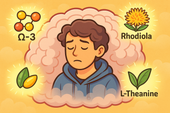
Brain Fog and Body Dysmorphic Disorder: Can Nootropic Supplements Help?
Brain fog often accompanies Body Dysmorphic Disorder, clouding focus and deepening emotional fatigue. Nootropic supplements like L-theanine, Rhodiola, and CoQ10 can help restore mental clarity, balance neurotransmitters, and bring calm energy back to the mind 🌿🧠.
-

How Stress Hormones Like Cortisol May Worsen Body Dysmorphic Disorder
Chronic stress floods the brain with cortisol — the hormone that keeps you on high alert. In Body Dysmorphic Disorder, this chemical overdrive fuels anxiety, distorts self-image, and traps the body in survival mode. Calming cortisol helps restore both peace and perspective 🌿🧠.
-

The Role of Neurotransmitters in BDD—and How Supplements May Help
Neurotransmitters like serotonin, dopamine, glutamate, and GABA shape how people with Body Dysmorphic Disorder perceive themselves. When these brain messengers fall out of balance, perception distorts — but targeted supplements can help restore calm, focus, and emotional regulation 🧠🌿.
-

What Is Body Dysmorphic Disorder? A Deeper Look at the Mind-Body Connection
Body Dysmorphic Disorder (BDD) isn’t just about appearance — it’s about perception. When brain chemistry, trauma, and stress distort self-image, the mind begins to see flaws that aren’t truly there. Healing starts by calming the nervous system and reconnecting mind and body 🪞🧠.
-

Keeping Calm in Competitive Sports: How to Train Your Mind, Body, and Chemistry for Peak Performance
Competitive pressure can overwhelm even the strongest athletes — but calm is trainable. By combining supplements like magnesium, L-theanine, and adaptogens with breathwork and mindset training, you can stay focused, balanced, and in control under any level of stress 🧠🏅.
-

Supplements for Parents Facing Toddler Tantrums: Staying Calm When Little Emotions Run Wild
Toddler tantrums can drain even the most loving parent — but your calm is powerful. With the right supplements like magnesium, L-theanine, and ashwagandha supporting your nervous system, you can stay patient, grounded, and kind, even when emotions run high 🧸🌿.
-

Workplace Stress and Anger Management Support
Workplace stress can quickly turn into frustration — but calm is a skill you can train. By combining supplements like magnesium, L-theanine, and adaptogens with breathwork and mindset tools, you can stay focused, patient, and emotionally grounded no matter how intense the office gets 💼🌿.
-

How to Stay Patient With Family During Stressful Holidays
Holiday gatherings can stir up old stress and test your patience — but calm is possible. With nervous system support from magnesium, L-theanine, and adaptogens, plus mindful breathing and clear boundaries, you can stay centered, kind, and grounded even when family chaos unfolds 🎄💞.
-

Supplements to Keep Calm During Traffic Jams
Getting stuck in traffic doesn’t have to ruin your mood. With calming supplements like magnesium, L-theanine, and ashwagandha, you can train your body to stay relaxed and focused behind the wheel — turning gridlock into a moment of grounded patience 🚗🌿.
-
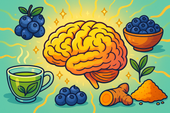
The Role of Antioxidants in Healing Brain Stress from Dissociation
Antioxidants protect the brain from the oxidative stress caused by trauma and dissociation. By neutralizing free radicals and supporting mitochondrial recovery, they help restore clarity, focus, and emotional balance — allowing the mind to heal at the cellular level 🌿🧠.
-
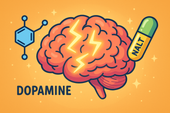
N-Acetyl L-Tyrosine (NALT) for Supporting Mental Clarity
N-Acetyl L-Tyrosine (NALT) fuels dopamine production — the neurotransmitter of focus and motivation. By supporting brain chemistry during stress, NALT helps restore mental clarity, energy, and alertness, making it easier to think clearly and feel present again ⚡🧠.
-
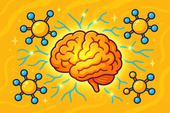
Phosphatidylserine and Dissociation: Supporting Cognitive Function
Phosphatidylserine helps calm the stress response by balancing cortisol, the body’s primary stress hormone. By lowering cortisol spikes, it protects memory, focus, and emotional stability — restoring clarity and mental presence for those struggling with dissociation 🧠🌿.
-
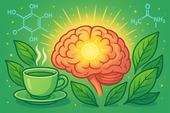
Can Green Tea Extract Help with Dissociative Brain Fog?
Green tea extract may help lift dissociative brain fog by supporting neurotransmitter balance, reducing inflammation, and enhancing energy at the cellular level. With its key compounds EGCG and L-theanine, it promotes calm focus, clarity, and emotional presence — helping you feel more alert and grounded 🍵🧠.
-
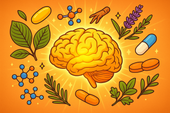
Building a Natural Supplement Stack for Dissociation Support
Building a supplement stack for dissociation means nourishing the brain and body back into communication. By supporting neurotransmitters, gut health, and energy balance through nutrients like magnesium, omega-3s, curcumin, and probiotics, you can help restore clarity, calm, and connection — one layer at a time 🌿🧠.
-

Chamomile and Lavender for Dissociative Anxiety Relief
Chamomile and lavender work together to calm dissociative anxiety by soothing the nervous system and restoring emotional safety. Their natural compounds balance cortisol, enhance GABA activity, and activate the vagus nerve — helping you feel grounded, connected, and at peace again 🌿💜.
-
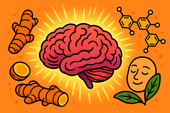
Curcumin for Inflammation and Mental Clarity in Dissociation
Curcumin, the golden compound in turmeric, does more than fight inflammation — it helps clear the mental fog often tied to dissociation. By calming neuroinflammation, balancing neurotransmitters, and supporting mitochondrial energy, curcumin can restore mental clarity, focus, and emotional presence 🌿🧠.
-
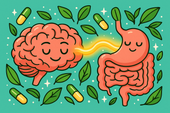
Probiotics and Dissociation: Exploring the Gut–Brain Axis
The gut–brain axis plays a vital role in emotional awareness and presence. When the microbiome is balanced, it supports serotonin production, vagus nerve activity, and calm focus. Probiotics help repair this connection — restoring safety, clarity, and the feeling of truly being in your body again 🌿🧠.
-
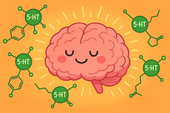
5-HTP for Dissociation: Supporting Serotonin and Emotional Stability
5-HTP helps bridge the gap between emotional numbness and stability by supporting serotonin production — the neurotransmitter that shapes mood, sleep, and sensory awareness. For people experiencing dissociation, 5-HTP may gently restore connection, presence, and emotional balance from the inside out 🌿🧠.
-
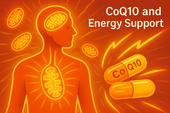
CoQ10 and Energy Support for People with Dissociation
Chronic dissociation often leaves the body running on empty — tired, foggy, and disconnected. CoQ10 helps recharge that system at the cellular level by restoring mitochondrial energy, reducing oxidative stress, and supporting the brain’s capacity to stay present. It’s energy medicine for both body and mind ⚡🧠.

















































